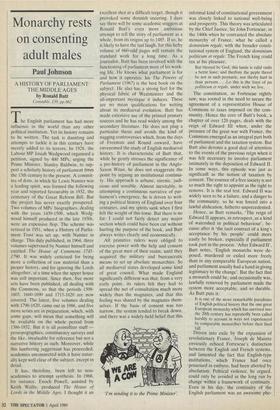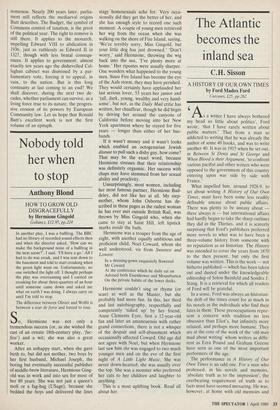Monarchy rests on consenting adult males
Paul Johnson
A HISTORY OF PARLIAMENT: THE MIDDLE AGES by Ronald Butt
Constable, BO. pp.6O2
The English parliament has had more influence in the world than any other political institution. Yet its history remains to be written. The task is daunting and attempts to tackle it in this century have merely added to its terrors. In 1928, the Labour MP Josiah Wedgwood organised a petition, signed by 400 MPs, urging the Prime Minister, Stanley Baldwin, to sup- port a scholarly history of parliament from the 13th century to the present. A commit- tee of dons, in which Sir Lewis Namier was a leading spirit, was formed the following year and reported favourably in 1932, the centenary of the Great Reform Bill. But the project has never exactly prospered. Two volumes of MPs' biographies, dealing with the years 1439-1509, which Wedg- wood himself produced in the late 1930s, were an expensive flop. The scheme was revived in 1951, when a History of Parlia- ment Trust was set up, with Namier in charge. This duly published, in 1964, three volumes supervised by Namier himself and entitled The House of Commons 1745- 1790. It was widely criticised for being more a collection of raw material than a proper history, and for ignoring the Lords altogether, at a time when the upper house was still important. Since then, five more sets have been published, all dealing with the Commons, so that the periods 1509- 1603, 1660-1690 and 1715-182(1 are now covered. The latest, five volumes dealing with 1790-1820. came out in 1986, and five more series are in preparation, which, with some gaps, will mean that something will be available on the whole period from 1386-1832. But it is all pointillists stuff — prosopographies, constituency surveys and the like, invaluable for reference but not a narrative history as such. Moreover, while this lumbering juggernaut has proceeded. academics unconnected with it have natur- ally kept well clear of the subject, except in detail.
It has, therefore, been left to non- academics to attempt synthesis. In 1968, for instance, Enoch Powell, assisted by Keith Wallis, produced The House of Lords in the Middle Ages. I thought it an excellent shot at a difficult target, though it provoked some donnish sneering. I dare say there will be some academic sniggers at Ronald Butt's even more ambitious attempt to tell the story of parliament as a whole, from its origins up to 1485. If so, he is likely to have the last laugh, for this hefty volume of 660-odd pages will remain the standard work for a long time. As a journalist, Butt has been involved with the functioning of parliament most of his work- ing life. He knows what parliament is for and how it operates: his The Powers of Parliament (1967) is the best book on the subject. He also has a strong feel for the physical fabric of Westminster and the all-important mystique it induces. These are no mean qualifications for writing about its mediaeval evolution. Butt has made extensive use of the printed primary sources and he has read widely among the secondary literature. He does not plug a particular thesis and avoids the kind of nagging controversies which, from the days of Freeman and Round onward, have envenomed the study of English mediaeval history. It is characteristic of Butt that, while he gently stresses the significance of a pre-history of parliament in the Anglo- Saxon Witan, he does not exaggerate the point by arguing an institutional continui- ty. His approach is urbane, eirenic, judi- cious and sensible. Almost inevitably, in attempting a continuous narrative of par- liament's emergence, he is driven to writ- ing a political history of England over four centuries, and my spirits sank when I first felt the weight of this tome. But there is no fat: I could not fairly detect any major section which could have been cut without hurting the purpose of the book, and Butt always writes clearly and economically.
All primitive rulers were obliged to exercise power with the help and consent of the great men of their realm, until they acquired the military and bureaucratic means to set up absolute monarchies. So all mediaeval states developed some kind of great council. What made England significantly different was that, from a very early point, its rulers felt they had to spread the net of consultation much more widely than the magnates, and that this feeling was shared by the magnates them- selves. If the basis of consent was too narrow, the system tended to break down, and there was a widely-held belief that this 'I'm sending it to the Prime Minister'.
informal kind of constitutional government was closely linked to national well-being and prosperity. This theory was articulated by the Chief Justice, Sir John Fortescue, in the 1460s when he contrasted the absolute monarchy of France, what he called a dominium regale, with the broader consti- tutional system of England, the dominium politicum et regale. The French king could tax at his pleasure,
But blessyd be God, this lande is rulid vndir a bettir lawe; and therfore the peple therof he not in such peynurie, nor therby hurt in their persons . . .Lo this is the fruyt of jus polliticum et regale, under with we live.
The constitution, as Fortescue rightly saw, was rooted in the need to secure the agreement of a representative House of Commons to taxes imposed on the com- munity. Hence the core of Butt's book, a chapter of over 120 pages, deals with the reign of Edward III when, under the pressure of the great war with France, the Commons emerged as an integral part both of parliament and the taxation system. But Butt also devotes a good deal of attention to the events of the previous reign when it was felt necessary to involve parliament intimately in the deposition of Edward II. In some ways, this episode was just as significant as the notion of taxation by consent. The essence of a free society is not so much the right to appoint as the right to remove. It is the real test. Edward II was widely seen to be a failure, and a danger to the community, so he was forced into a lawful abdication, hitherto unprecedented.
Hence, as Butt remarks, 'The reign of Edward II appears, in retrospect, as a kind of watershed in political behaviour', be- cause after it 'the tacit contract of a king's acceptance by his people' could more easily be broken, especially if parliament took part in the process. 'After Edward II', Butt notes, 'English monarchs were de- posed, murdered or exiled more freely than in any comparable European nation, and parliament usually had a hand in giving legitimacy to the change'. But the fact that a monarch could be, and occasionally was, lawfully removed by parliament made the system more acceptable, and so durable. As Butt puts it:
It is one of the more remarkable paradoxes of English political history that the one great European monarchy which has survived into the 20th century has repeatedly been called harshly to account in ways not experienced by comparable monarchies before their final fall.
Driven into exile by the expansion of revolutionary France, Joseph de Maistre enviously echoed Fortescue's distinction between the English and French systems, and lamented the fact that English-type institutions, which France had once possessed in embyro, had been aborted by absolutism. Political violence, he argued, could only be avoided in the long run by change within a framework of continuity. Even in his day, the continuity of the English parliament was an awesome phe- nomenon. Nearly 200 years later, parlia- ment still reflects the mediaeval origins Butt describes. The Budget, the symbol of Commons control of taxation, is the pivot of the political year. The right to remove is still there. It applies to the monarch, impelling Edward VIII to abdication in 1936, just as ruthlessly as Edward II in 1327, though with less brutal consequ- ences. It applies to government: almost exactly ten years ago the dishevelled Cal- laghan cabinet was dismissed by a par- liamentary vote, forcing it to appeal, in vain, to the nation. But is this long continuity at last coming to an end? We shall discover, during the next two de- cades, whether parliament can survive, as a living force true to its nature, the progres- sive erosion of its powers by European Community law. Let us hope that Ronald Butt's excellent work is not the first volume of an epitaph.



















































 Previous page
Previous page